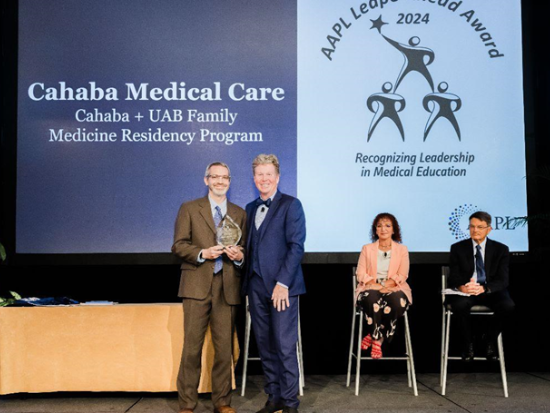
The Cahaba+UAB Family Medicine Residency was one of only two programs nationwide to receive the American Association for Physician Leadership's (AAPL) prestigious 2024 Leape Ahead Award.
The Leape Award honors the extraordinary dedication and commitment of Lucian Leape, M.D., a former pediatric surgeon who emphasized establishing a respectful, professional training environment for medical students and residents.
The Cahaba+UAB program, a 20-20-20 program, offers four tracks. Urban, Rural, and Frontier serve counties in the Alabama Black Belt, while Highlands is based in Birmingham out of UAB Hospital-Highlands. To date, the residency has trained 62 residents in primary care in underserved parts of central Alabama, with 75% of graduates entering primary care in medically underserved communities. That is three times higher than the national average. Additionally, 25% of Cahaba-UAB program graduates enter primary care in rural underserved communities, an incredible 5 times higher than the national average.
"Family medicine physicians have such an important role to play in improving health care access and outcomes in Alabama, and the students joining the Cahaba+UAB Family Medicine Residency are part of a rising generation of physicians meeting those needs," said Irfan Asif, M.D., chair of the Department of Family and Community Medicine, associate dean for primary care and rural health and director of UAB's primary care service line. "UAB is a national leader as an innovative academic medical center, and Cahaba Medical Care has a decade-long proven track record of community-based training, placement, and retention of physicians in rural and underserved locations. So, this has been a wonderful and valuable partnership, critical to shaping primary care across the state."
Cahaba Medical Care established its Family Medicine Residency in 2013 to address the state's lack of access to primary care services, particularly in rural and urban underserved areas.
Attracting residents to Alabama is critical for addressing this crisis. According to reports from the Association of American Medical Colleges (AAMC), the location of a physician’s residency greatly impacts where they choose to practice post-training. A majority of medical residents—57.1%—who completed residency training between 2013 and 2020 continue to practice in the same state. Prior AAMC reports reveal the same percentage (57.1%) for those who completed residency training between 2012 to 2021 and 2011 to 2020.
"To address the primary care shortage in underserved areas of greatest need, there has to be intentionality in where these training programs occur and what these graduates are trained to do. We need to train residents and fellows in a learning environment that mirrors their future practice," said Lacy Smith, M.D., co-founder and associate program director of Cahaba+UAB Family Medicine Residency and co-founder and COO of Cahaba Medical Care.
Smith says the program's success demonstrates the importance of intentional training programs that prepare family medicine residents to practice in underserved areas.
According to AAPL, the organization established the Leape Ahead Award in 2011 to recognize institutions and their leaders dedicated to improving the quality of health care by cultivating medical students and residents into future health care leaders. Virginia Mason Medical Center's Leadership in Quality Improvement Pathway Program was also honored with a Leape award this year.